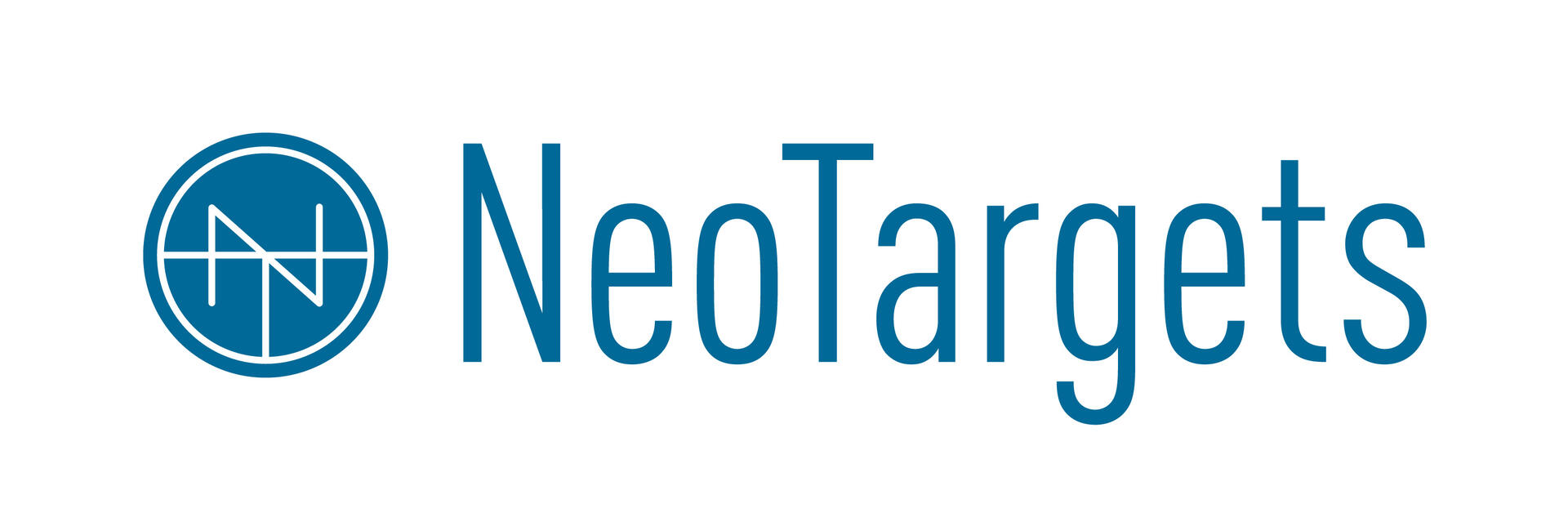NeoTargets
Generating validated targets and preclinical drugs with a curative potential for targeted treatments of cancer.
At NeoTargets, we utilize our proprietary oncotarget discovery platform to identify drug targets that demonstrate significant potency and safety against primary cancer cells while minimizing effects on vital tissues and normal cells. Our pipeline focuses on early-stage drug development projects catering to hematological malignancies, ovarian cancer and glioblastoma.

Background
The survival rate for a broad range of cancers remains unacceptably low. In addition, 97% of clinical studies against cancer fail, mainly because of high toxicity and low efficacy of the drug candidate. A major reason behind this low success rate in clinical studies can in most cases be traced back to poor assessment during preclinical research. There is a lack of systematic assessment of drug targets, and routinely model systems with low predictive value that are insufficient to assess the efficacy of targets and drugs are engaged.
At NeoTargets we can increase the probability that candidates selected will not fail in clinical studies, by selecting the best targets against the disease and followingly validate them before the clinical studies are initiated, thereby saving precious time, money and ultimately also lives.
The team behind NeoTargets has long-standing expertise in cancer biology, drug target discovery and drug discovery with a proven ability to bring successful projects to the clinics. We have established a pioneering oncotarget discovery platform, consisting of an in-silico target assessment tool for systematic identification and prioritisation of targets with optimal characteristics (e.g. “druggability” and selectivity against cancer cells).
Selected candidate targets are functionally validated in a stepwise fashion on:
- Relevant cancer cells
- Translational cell models for toxicity
- Well-characterised patient samples, including cancer-initiating cell populations
- Patient-derived xenograft (PDX) mouse models
Validated targets are further investigated for mechanisms of action and potential molecular biomarkers.
Our efforts are directed towards the generation of validated targets and preclinical drugs demonstrating proven efficacy against primary cancer cells, including cancer-initiating cells, while minimizing impacts on vital tissues. By doing so, we strive to offer targets and preclinical drugs with the potential for curative interventions, facilitating the development of novel targeted treatments.
Mission, vision and strategy
Mission
Our mission is to identify optimal therapeutic targets and to develop safe and efficient drugs with a curative potential for the treatment of cancer.
Vision
Our vision is to become a leading developer of targeted and effective therapeutic approaches for patients with unmet medical needs.
Strategy
We identify and validate optimal therapeutic targets using our pioneering oncotargetTM discovery platform. These targets are the basis for preclinical drug development projects that are conducted by NeoTargets and its partners.
Commercialisation of the products are pursued trough collaborations with established drug companies based on either sale and licensing of the validated drug targets or preclinical drugs.
Research and Technology
Introduction
At NeoTargets, our unique oncotarget discovery platform comprises a proprietary bioinformatic tool used for the identification of optimal target candidates, followed by their functional validation in translational model systems, encompassing toxicity models, patient samples, and animal models.
01
The in-silico target assessment tool
Approximately 15% of clinical trials are discontinued due to target toxicity arising from harmful targets. At NeoTargets, we have developed a unique in silico assessment tool, enabling the identification of cancer-specific and safe targets with optimal characteristics across 135 different cancer types. Through a comprehensive comparison of our target data with clinical information, we can effectively eliminate all harmful targets, surpassing the performance of other available tools tested thus far (e.g., DepMap).
02
Validation of cancer dependencies
Firstly, identified candidate targets undergo validation for their significance in various relevant cancer cell lines specific to the indication of interest. Typically, over 90% of the candidates successfully pass this crucial validation step.
03
Functional assessment of toxicity in normal healthy cells
Toxicity in vital organs, including the cardiovascular, liver, hematologic, and nervous systems, poses a significant challenge in cancer treatment. Therefore, to mitigate the risk of toxicity during downstream drug testing, all identified targets undergo thorough investigation for potential harmful effects on normal blood cells, cardiomyocytes, hepatocytes, and neurons at the earliest stages of the process.
04
Validation of targets using primary cancer cells
The targets will undergo validation to assess their significance in well-characterized patient samples, facilitating the identification of targets suitable for combating specific subtypes of cancer (e.g., P53 mutated cancer). Given the curative potential of strategies targeting cancer-driving cells, our priority lies in the identification of targets that can effectively eliminate this particular cell type.
05
Validation of candidate targets in xenograft animal models
To ascertain whether the inhibition of the targets can impede disease progression and enhance survival rates, we will validate them using patient-derived xenograft (PDX) mouse models.
06
The molecular mechanisms behind the selective importance in cancer cells
The ultimate target candidates will undergo investigation for their mechanisms of action and predictive markers, utilizing functional genomics.
07
Projects and therapeutic areas
Collaboration projects
Acute myeloid leukemia
Acute myeloid leukemia (AML) is an aggressive haematological disorder with dismal prognosis. The standard treatment for AML is chemotherapy but this regimen causes severe side effects and have low curative potential. In collaboration with the Swedish drug development company Sprint Bioscience, we are validating optimal therapeutic targets for AML using our technology platform.
Pipeline of projects available for partnerships
Multiple myeloma
With an aim to address the challenges posed by multiple myeloma, we have identified 25 promising target candidates for intensive validation. Notably, these candidates exhibit essentiality in multiple myeloma cells while sparing normal cells. In ongoing work, we have initiated a drug discovery program targeting a highly promising candidate with optimal biological characteristics and significant druggability potential.
Pancreatic cancer
Pancreatic cancer boasts the highest mortality rate among all cancers, with a mere 12% survival rate over five years. In response to this formidable challenge, we have developed patient-derived in vitro and in vivo model systems and identified more than 20 optimal candidate targets.
Glioblastoma multiforme
The devastating impact of glioblastoma multiforme demands urgent attention. In our research on this lethal brain cancer, we have identified 25 promising candidates slated for rigorous validation using patient-derived cancer cells and advanced animal models.
Ovarian cancer
Ovarian cancer stands as the leading cause of mortality among women with gynecological cancers. In 2022, over 313,000 new cases and 207,000 deaths were reported. In our efforts, we have identified a set of highly promising target candidates, and we’ve established clinically relevant model systems for further exploration.
Acute lymphoblastic leukemia (ALL)
ALL urgently requires effective treatments due to its rapid progression. Key challenges include minimizing treatment toxicity, overcoming drug resistance, and managing high relapse rates. We have identified a set of very promising targets that will soon undergo pharmacological and functional validation in patient samples.
Secondary bone cancer
Secondary bone cancer is an advanced and challenging form of cancer, often associated with a poor prognosis and considered incurable. In response to this pressing medical need, we have identified 30 promising candidate targets. These targets will undergo rigorous functional and pharmacological validation in state-of-the-art model systems specifically designed for this disease.
Nondisclosed projects
Other cancer types than the above with unmet medical needs with existing translational model systems.
NeoTargets continues to broaden its portfolio, addressing various cancer types with unmet medical needs. Our dedication to leveraging established translational model systems underscores our commitment to advancing novel treatment solutions for a range of cancers.
Collaborations and partnerships
To secure a professional management and further successful development of the company, NeoTargets has partnered with the Danish company, Marigold Innovation. By merging the senior biotech executive team from Marigold with the scientific group from NeoTargets, we have established a dynamic group with complementary competences and strong execution power.
Research collaborations and partnerships are essential in successful R&D, and a central part of NeoTargets’ strategy to maximise quality, progress, and commercial goals for our projects. In addition to our expertise, well-established model systems, and unique technology, NeoTargets collaborates closely with various researchers, partners, and clinicians for complementing biological and clinical expertise as well as state-of-the-art model systems with high translational value.
NeoTargets has an ongoing research collaboration project in acute myeloid leukemia with the Swedish listed drug development company, Sprint Bioscience.
Business model
NeoTargets’ business model: Focus on asset creation and out-licensing/partnering
NeoTargets has established a full platform for the development of safe, new cancer therapeutics from target identification to preclinical drug candidate validation.
Initially, the proprietary oncotarget platform is applied to generate comprehensive databases of potential drug targets with pre-validated efficacy and safety in different types of cancer.
Subsequently, drug development projects for selected targets are initiated, now using the platform to screen a diverse range of drug candidates from libraries of traditional small molecule inhibitors, molecular glue degraders, and bifunctional protein degrading molecules such as PROTACs.
For each specific target:candidate combination, the projects aim to generate preclinical proof-of-concept, thereby generating a portfolio of assets that can be partnered, out-licensed, or sold at various stages of development.
This approach allows the Company to explore different mechanisms of action and therapeutic strategies to combat cancer and provide optimal opportunities to partners or licensees to advance the drug candidates further and bring them to market.
Management
Please contact us for any questions
NeoTargets AB
Vegagatan 11B
17234 Sundbyberg
Sweden
Org.nr: 559353-1527
Phone: +46 709 526 897
Email: info@neotargets.com




